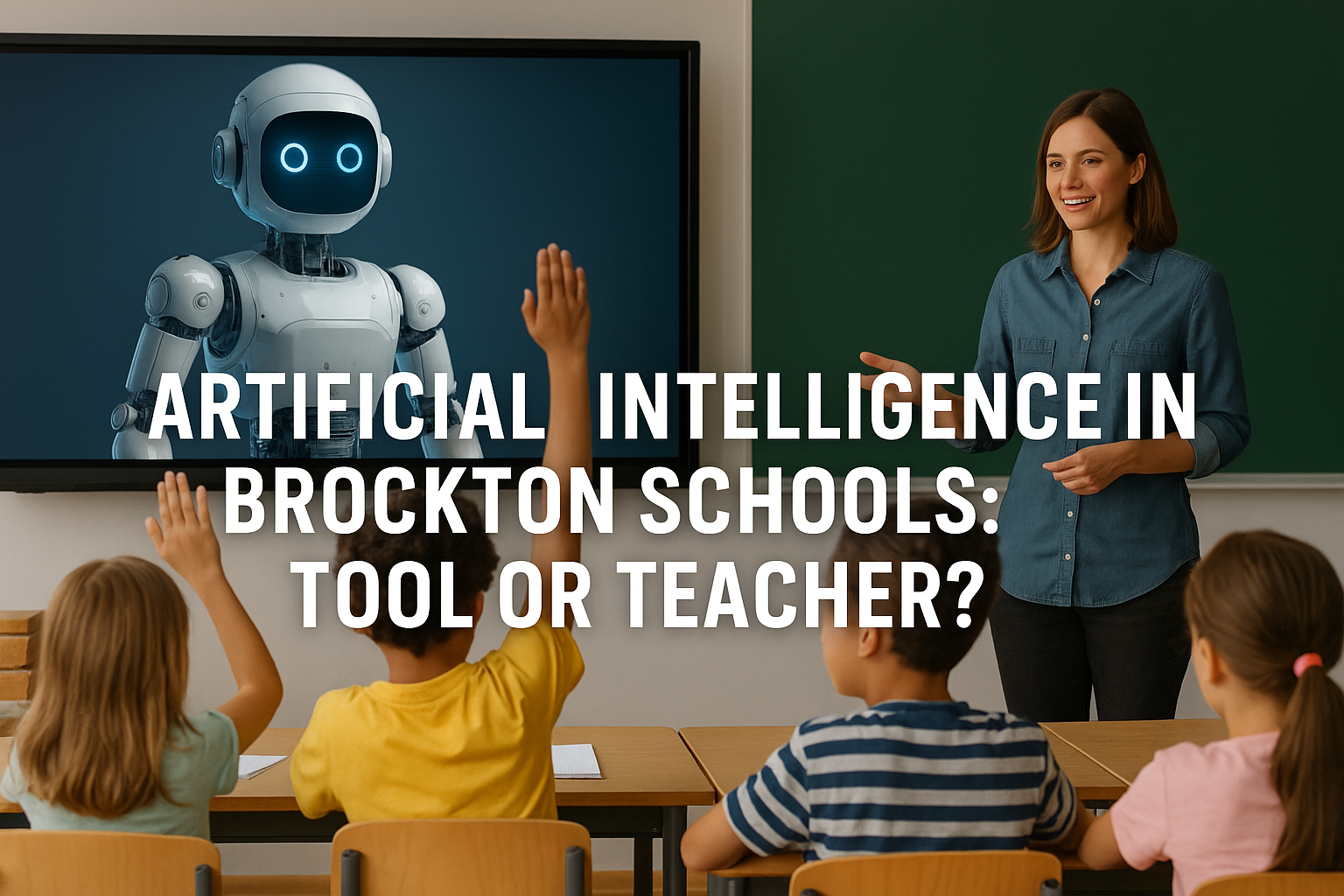A Position Paper by Stephen Pina, Candidate for Ward 1 School Committee
Introduction
Artificial Intelligence (AI) is reshaping nearly every corner of our society—from the way businesses track their budgets to the way children get help with their homework. In K–12 education, AI is being marketed as a cure-all: a way to raise test scores, cut costs, and lighten the workload on teachers.
But the question for Brockton is not “Will AI be used in our schools?” It’s already here. The real question is: Will AI strengthen the fundamentals of education—or replace them?
DESE Article that brought the conversation up
As a father of four children in Brockton Public Schools, a veteran, and a candidate for Ward 1 School Committee, I believe AI has a role in our classrooms—but only as a servant, never as the master.
The Current Landscape: AI in K–12
Across the country, districts are experimenting with AI in several areas:
- Personalized Learning: Adaptive reading and math programs adjust to each child’s level.
- Tutoring & Remediation: AI chatbots provide 24/7 homework help.
- Administrative Efficiency: Algorithms optimize bus routes, scheduling, and budgeting.
- Special Education & Early Childhood: Tools assist with speech recognition, autism communication, and literacy practice.
- Classroom Management: Automated grading and behavior tracking free up teacher time.
The promise is efficiency, equity, and innovation. The risk is dependency, surveillance, and a further decline in human-led instruction.
Where AI Fits the Champion City Project
1. Raise Academic Standards
Brockton students deserve the basics: literacy, numeracy, and cultural knowledge. AI can help track real-time literacy benchmarks and flag struggling students earlier. It can provide data dashboards that make progress transparent to parents and taxpayers—an idea already central to my plan.
But here’s the red line: AI cannot replace teachers. The art of teaching—discipline, mentorship, human connection—cannot be outsourced to a machine.
2. Safe & Disciplined Schools
AI tools promise to monitor student behavior or predict conflicts. But discipline is not a computer function—it’s a human responsibility. Parents and principals must set standards, and teachers must have authority to enforce them.
Where AI can help is by reducing paperwork. Freeing teachers from administrative burdens gives them more time to restore order in classrooms. Safety comes from adults in charge, not algorithms watching from the corner.
3. Fiscal Responsibility & Transparency
Brockton faces real fiscal challenges. AI can be a powerful tool to stop waste: smarter bus routing, analyzing overtime costs, or automating financial reporting. Imagine a taxpayer dashboard that shows where every dollar goes in real time—this is where AI can shine.
But any investment in AI must meet a strict test: Does it save taxpayers money or improve student results? If not, we don’t buy it.
4. Real-World Pathways to College, Trades, or Service
The economy our children will inherit will be shaped by AI. To prepare them, Brockton must teach students not just to use AI, but to compete with it. That means teaching coding, digital literacy, entrepreneurship, and critical thinking.
As part of my “Win at Life” graduation track, students should graduate knowing how AI works, where it helps, and where it fails. We will not raise passive consumers of technology—we will raise leaders who can adapt, compete, and win.
Guardrails for AI in Brockton Schools
To make sure AI strengthens—not undermines—our schools, I propose these principles:
- Teacher First: AI supports teachers; it never replaces them.
- Parental Rights: Parents must have full transparency into any AI tools, data collection, and classroom use.
- Fiscal Accountability: Every AI purchase must be tied to measurable student outcomes or taxpayer savings.
- Data Privacy: Students’ personal data belongs to families, not private vendors or tech companies.
- Balanced Learning: Technology cannot crowd out human interaction, discipline, or cultural literacy.
My Conclusion
Brockton’s schools don’t need more gimmicks. They need accountability, safety, and higher standards. AI can help—but only if it is kept in its proper place.
As your School Committee representative, I will ensure that:
- AI is used to track progress, not push ideology.
- AI is a tool for transparency, not surveillance.
- AI prepares students for the future of work, without replacing the fundamentals of reading, writing, and respect.
Our children must master technology without being mastered by it. That’s how we restore Brockton’s culture of winning—and that’s how we build Strong Schools, Strong Brockton.
Stephen Pina
Candidate, Ward 1 School Committee – Brockton 2025
VotePina.com | @VotePina | [email protected]


0 Comments